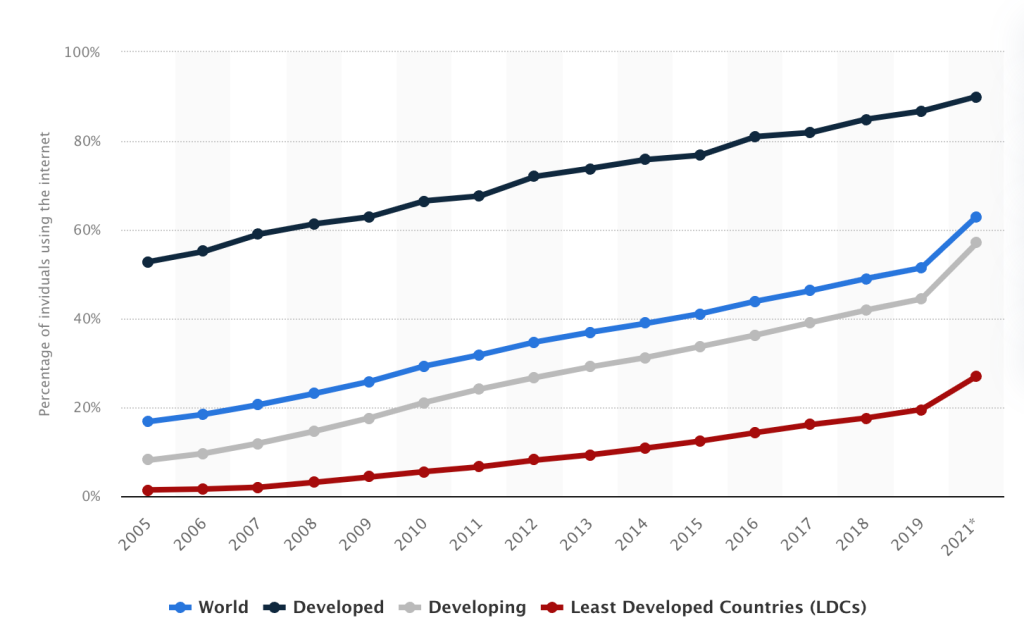
When generations imagine the future, they are often very wrong.
This is because they can only use their past and present as a basis for predictions. In this article we looking at the future as significant leap in technology. However, the word “significant” is completely subjective. For you, sitting and reading this text on a computer that is more than 100,000 times more powerful than the one that sent us to the moon just 53 years ago, the transition from a sharpened stone to a knife may not seem like a significant leap in technology.
This technological leap would have been huge for our extinct biological cousin, Home Erectus. Homo Sapiens have existed with the same cognitive ability for approximately 70,000 years. Homo Erectus lived on earth for about 2 million years, but their technology remained static, never advancing beyond the various forms of sharpened stones. Without the development of technology, did they even have a future?
Over the past more than 60 years, the future of humanity has been determined world of bits, that is digital reality. This world has received many names: network, Internet, cyberspace, and now - Metaverse.
What will our future be like in the Metaverse?
Almost everyone involved in developing and investing in technology web3, belongs to the category of futurists. Futurists naturally look at the future with delight and excitement. They were early users of the Internet, early users of second-generation web applications, and they are early users of web3. Futurists are ready to jump off a cliff into the abyss of the unknown, and therefore they are usually entrepreneurs.
The end users of these technologies are, for the most part, not futurists.
This means that they look at the future with delight and excitement only if it seems securely anchored in their current reality and improves that reality.
Why do people look at Tesla And Elon Musk with admiration rather than fear?
Tesla:
✅ A brand focused on current reality - cars.
✅ Improving this reality is faster, sleeker and cleaner cars.
For the majority of people Metaverse is somewhere between a video game and the virtual reality hellhole Mark Zuckerberg.
Metaverse:
❌ Focused on current reality - people do not spend their waking hours in immersive VR environment.
❌ Improvement compared to their current reality - connection between Metaverse and the Internet is unclear.
Convergence of many trends, not just one trend
The mental model that needs to be inculcated into the cultural consciousness is that the Metaverse is not one big scary "something" - it is a collection of independent trends that all converge at one point.
The most important of these trends are:
- More people are gaining access to the Internet.
- Time spent in front of a screen is on the rise.
- Remote work + Covid.
- Technology is becoming more immersive.
- Games (penetration and investment).
- Blockchain and NFTs enabling digital ownership.
World online
In order for people to work, play and maintain relationships in a connected virtual world, we need an Internet connection. Internet access worldwide is 63%, up from 50% in 2019. 91.5% of North Americans have stable access to the Internet (89.5% have stable access to food).
Internet penetration is also growing in developing countries. From 2019 to 2021, Internet access in developing countries increased by 13% (from 44% to 57%). The world's least developed countries experienced a 7% increase in Internet availability between 2019 and 2021, exceeding their average annual growth of ~1.5%.

Screens dominate our lives: More and more people are accessing the Internet, and these people are spending more and more time online. 91% adults in the US say they access the Internet daily. Of these, 31% admit that they are online almost constantly. On average, a person spends 7 hours a day (about 40% of time while they are awake) in front of some kind of screen.
“Remote work is the future”
Many still stubbornly cling to the idea "return to normality". However, the truth is that the world will never return to the way it was before. Before the pandemic Covid It would be strange to suggest meeting virtually, especially if the person is at a commuting distance. Now companies are closing funds worth more than $100 million and creating “unicorns” without meeting investors or colleagues in person. Covid has shown everyone that most office jobs can be done from home. Of the 2,050 full-time workers surveyed, 90% felt they were becoming the same or more productive at home than in the office. By 2022, 25% of all professional jobs in North America will be performed remotely.
The gaming industry is the new mainstream.
According to statistics, the number of gamers around the world is approaching 3 billion. These people are accustomed to maintaining close connections with those whom they will never, and probably will never, meet in person. More than 50% children aged 9 to 12 years play Roblox at least once a week. Without realizing this fact, these children are preparing to work together and form friendships with people they have never met in real life. They also gain experience interactions in complex digital ecosystems, which could be very valuable in the future. These digital economies could one day become more valuable than today's global economy.
Assessed value The virtual goods market is $30 billion and is predicted to grow to $190 billion by 2025.
Immersive technology is getting really good.
Where our friends are Homo Erectus, for 2 million years they have not advanced beyond sharp stones, Samuel Morse sent the first telegraph message “What did God create?"in 1844, just 178 years ago. We can now instantly communicate in an open, immersive virtual world with people living on every continent on Earth.
Augmented reality technologies—such as virtual, augmented, and mixed reality—have long captivated our collective imagination. The penetration of this technology into society both frightens and inspires us. The extended reality industry is expected to grow from $45 million to $330 million by 2025. About 20% of Facebook employees work in the company's AR/VR division, called Facebook Reality Labs.

Big discovery
A big discovery for our collective future Metaverse happens thanks to NFTs And blockchain technologies. NFTs became the basic atomic unit for Metaverse. They provide true ownership in the digital world. They represent rights, they represent law and order.
The metaverse is the Internet with property.
Most value and property in the digital world belongs to Google, Apple, Microsoft, Meta, Amazon and others. Countless hours spent on Facebook, Google, Reddit, do not provide any benefit and you do not receive any value for your interactions on these platforms, although these companies benefit financially from your interactions.
The metaverse is here, but it's communist.
But how many people jumped over the Berlin Wall to get into the Soviet Union? How many people fled from South Korea to North Korea?
Before the appearance NFTs and platforms, we were just tenants, ready to extract value.
WITH NFTs we become owners, existing on the same level and having the same rights as the platforms themselves.
Without Metaversebased on technology blockchain and true property, it will truly become the big tech hell pit we all fear.
We want to live in a Metaverse where we are free to control our destiny, and that starts with true ownership through NFTs.
Translation author articles: love mushroom
